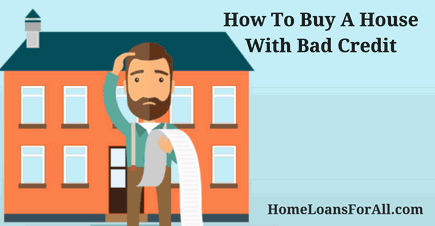
The credit score you have will tell you whether you are a successful applicant for a mortgage loan or not. It’s a number that determines your riskiness of paying back what you owe to the lenders plus your credit score determines your mortgage interest rate. If you are reading this you have probably calculated your scoring already and if it isn’t as high as you need it to be, no worries. This article is here to help when you’re trying to buy a house with bad credit.
First of all, you need to fix all financial issues in your report if you want the process of buying your dream house to be smooth and pleasant. These days almost every U.S. family has credit card debt of approximately $15,000 so it’s nothing new to buy a home with a bad credit. It’s just a matter of knowing this experts’ information on how to raise your score and be approved for a loan. Here’s how to buy a house with bad credit in 8 easy steps:
Find resources for bad credit home loans by state and by city!
Step 1: Understand Credit Scores
In order to improve it, you first must know what it is. Your credit score is calculated based on the values and numbers you have on the credit report. Here are the five most important and their percentage of impact on your score:
- Payment history (35%)
Making payments on time is extremely important when trying to get your scores up. If you are 30 days late with your payment, for example, you might experience anywhere from a 90- to a 110-point drop in your score. Even if you haven’t missed a payment before in your life, a single occurrence like this will result in this significant drop and might disrupt your plans badly.
- Debt-to-credit utilization (30%)
This represents the amount of debt you have accumulated on all your credit cards so far divided by the limit of those cards. This means that your habit of taking all there is to the limit is hurting your score badly, which is why by the experts’ advice, you should keep this ratio no more than 30%.
- Length of credit history (15%)
The longer your credit history is, the higher your scoring will be. This is why it’s advised to keep all your credit accounts open, even if you have zero balance on them.
- Credit mix (10%)
People who have a combination of credit cards along with car loans, mortgage loans, retail accounts, and/ or installment loans in their portfolio usually have greater credit scores.
- New credit (10%)
At times when planning to have your financial status checked, you should avoid opening multiple new credit applications because it lowers your score by five points.
Step 2: Knowing the Perfect Credit Score:
Having the ideal credit score should be around 850. If this sent shivers down your back because you are far below it, no worries, in truth, only 0.5% of the applicants have this number. If you are somewhere around 750 you are in the great range and your chances of getting approved are high. If your score is below this but still in the 700s you are still able to qualify for a loan with a solid interest rate. Most lenders prefer 660 in order to give you a good interest rate and to keep the process of approval run smoothly. That being said, there are still many lenders out there that will work with individuals looking to buy a house with bad credit.
Step 3: Get Approved Without Credit History
Since the length of your credit history plays at least a 15% importance in your credit scoring, you should start building it as soon as possible, ideally in your 20s. However, if you don’t have it, there are other things lenders look at, and they aren’t necessarily a part of your credit report. If you keep your monthly rent payments, or car loan payments (and you have paid on time), lenders will be satisfied with it as well since it shows that you are responsible for your own debts.
Step 4: Having Bad Credit or No Credit, What’s Better?
Remember that poor credit can be managed and raised, having no credit is a completely different story. If you have it lower than you want your score to be, you can always consult with a mortgage lender to help you discover what you did wrong and if there is room to improve things. Also it’s good to know that there are loan programs like the FHA that require a low credit score, as low as 580 actually with the chance of getting a 3.5% down payment. Another helpful thing if you are a military veteran or a member of your family is, you can get a VA home mortgage approved with 0% down payment – program designed by the Department of Veterans Affairs. With all the many mortgage options out there, it’s not impossible to buy a house with bad credit. Take a look at our comprehensive guide on getting a bad credit home loan here.
Step 5: Boost Your Credit Scores
In order to get your numbers up, you should consult with a financial adviser who can look back to your habits that damaged your score in the first place. Here are some tips on how to start:
- Paying bills on time: The easiest way to be trusted among lenders is to show that you are able to pay your debts on time, each month. If it sounds tough you might need to adjust your spending habits and meet with an expert who can advise you on how to design your monthly budget.
- Paying credit card debts: It’s helpful if the charges to your credit cards aren’t exceeding 1/3 of your limit. If this isn’t something you can lower than raising your limit might do the trick. Try contacting your bank and see if you can raise your credit card limit.
Step 6: Fix Errors On Your Credit Report
Fixing errors on your credit report should be done as soon as you spot one. You have the right to get a copy of your report, so use that to review it carefully because statistics show that 1 in 4 Americans noticed errors in their reports. It’s vital to spot them early in the process of buying your home because it takes time to get the right information updated.
Step 7: Remove Black Marks on Your Credit
If you happen to be a one-time offender and your report shows a missed payment, you can probably ask your creditor for a deletion. If he or she approves, then letters with request for deletion will be sent to the credit bureaus, requesting this process. After that, it’s up to you to gather all the updated documents and have them for a recalculation of your credit score – which should be higher this time.
This process is called “rapid rescore”, and will make all the difference when trying to buy a home in a highly competitive market.
Step 8: Get Help with Your Financial Situation
There are two sides to this depending on whether you have fallen behind on paying your debts of you just need a financial counseling. So, a credit counselor is there to create a plan (with your assistance, of course) to pay back your creditors and will teach you how to manage your money in the future. A debt-management company, on the other hand, will try to reduce the amount you owe to the creditors by negotiating with them. Note that the first one costs relatively less than the second type of service, so if your debt situation isn’t so serious, a debt-management company isn’t what you need at this point. However, a credit counselor will be needed if you have several credit accounts and you are unsure of which one to pay off first. They will set you on the right path and help you understand it better for the future. Except for companies, you might even find a nonprofit organization that deals with these things and will help you manage your financial accounts successfully free of charge. These 8 easy steps should help when you’re ready to buy a house with bad credit.











